calsfoundation@cals.org
Joe Edward Purcell (1923–1987)
Joe Edward Purcell was a lawyer and politician who shocked the political establishment in 1966 by defeating the state’s colorful attorney general, Bruce Bennett, in the Democratic primary. Although Purcell never realized his dream of becoming governor, he was elected attorney general twice and lieutenant governor three times during his political career.
Joe Purcell was born on July 29, 1923, in Warren (Bradley County). He was the oldest of three children of Edward L. and Lynelle Cunningham Purcell. His father, known as “Buddy,” remarried and moved to Texas. His mother worked in her father’s grocery store in Warren and, many years later, at the Arkansas Department of Education at Little Rock (Pulaski County). His grandfather, Fred Purcell, was the town’s most prominent attorney, which influenced his own choice of career. Purcell left high school after his junior year to join the army. He was stationed for most of World War II in the Panama Canal Zone with the Ordnance Corps. After Pearl Harbor, the United States’ western shore and the Canal Zone were considered vulnerable to Japanese attack—the Canal Zone because of its importance to the navy and ammunition supplies.
After World War II, Purcell attended college briefly in Fort Worth, Texas, and then graduated in 1948 from Little Rock Junior College (which later became the University of Arkansas at Little Rock) with an associate’s degree. In 1948, he met Helen Hale of Prescott (Nevada County), who had graduated from Texas Women’s University and was about to become a teacher, and they married after a brief courtship. They eventually had two daughters. Purcell obtained a law degree from the University of Arkansas School of Law in 1952 and started a law practice alone in Benton (Saline County).
Purcell’s political career began modestly in 1955 as the Benton city attorney, a part-time job. He was elected municipal judge in 1958 and served eight years trying traffic and minor criminal cases.
In the summer of 1966, he entered the race for attorney general against Bruce Bennett, a flamboyant segregationist whose attacks on “race mixing” and the federal courts had propelled him through four terms. Underfinanced and cautious to a fault, Purcell seemed to make little impact in the campaign except for a two-page ad in the Arkansas Gazette listing the names and telephone numbers of hundreds of people in Saline County who were quoted as saying: “We’re Joe Purcell’s friends and neighbors in Saline County. Please call us collect if you want to know more about this fine man.” However, he defeated Bennett in the Democratic primary and easily defeated a Republican, Jerry K. Thomasson, in the general election.
One of his first acts as attorney general was to sue Arkansas Loan and Thrift Corporation, a hybrid savings bank in western Arkansas that Purcell contended was operating illegally while state banking and securities regulators looked the other way. Eventually, a federal judge closed the bankrupt thrift company, which had squandered the savings of more than 2,000 people, and a grand jury indicted three executives and Bennett, who had been a secret founder. Bennett was indicted on twenty-eight counts of securities, mail, and postal fraud, but he was never tried because the judge concluded that he was too sick from throat cancer to stand trial.
Purcell opened the first consumer protection division in the attorney general’s office and rewrote the state’s convoluted election laws, which he said had made voting fraud too easy. The legislature enacted the new code in 1969.
George Fisher, the editorial cartoonist at the Arkansas Gazette, labeled Purcell “Honest Joe” and caricatured him in a stovepipe hat akin to Abraham Lincoln’s. However, due to his wooden speech and stage manner, Purcell also developed a reputation for being exceedingly dull. In 1970, a Gazette political reporter wrote, “People have been known to fall asleep shaking Purcell’s hand.”
Purcell was favored to win the governorship in 1970, when eight Democrats lined up to take on Governor Winthrop Rockefeller, who was running for a third term. However, Dale Bumpers, an unknown lawyer from Charleston (Franklin County), edged Purcell out for second place behind former governor Orval Faubus in the Democratic preferential primary. Bumpers later won landslide victories over Faubus in the run-off and Rockefeller in the general election.
Governor Bumpers made Purcell chairman of the state Democratic Party, and, in 1974, Purcell was elected to the first of three terms as lieutenant governor. At the request of Governor David Pryor, he directed Arkansas’s celebration of the nation’s bicentennial in 1976.
Purcell ran for governor again in a Democratic race in 1982 that included Bill Clinton and former U.S. Representative Jim Guy Tucker. Though ill from diabetes and arthritis and overwhelmed by Clinton’s and Tucker’s superior fundraising, Purcell reached a runoff with Clinton but lost by 33,000 votes.
Although he was never elected governor, Purcell served as acting governor of Arkansas for six days in 1979 after Governor David Pryor resigned to take a seat in the U.S. Senate. As lieutenant governor, he assumed the office until the newly elected governor, Clinton, was sworn in.
After his defeat in 1982, Purcell resumed his law practice in Benton. He died on March 5, 1987. He is buried in New Rosemont Cemetery in Benton.
For additional information:
Clinton, Bill. My Life. New York: Alfred A. Knopf, 2004.
“Joe Purcell Dies at 63.” Arkansas Gazette. March 6, 1987, pp. 1A, 21A.
Ernest Dumas
Little Rock, Arkansas

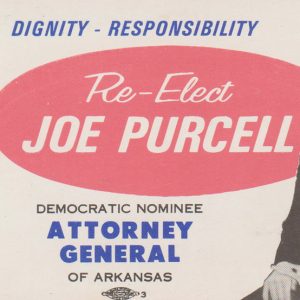 Purcell Campaign Card
Purcell Campaign Card 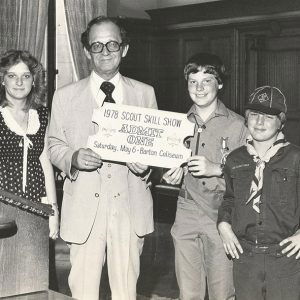 Purcell with Scouts
Purcell with Scouts 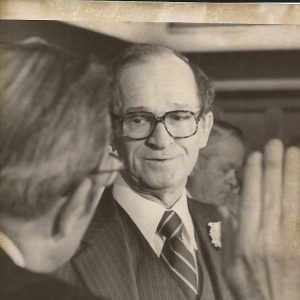 Joe Purcell Swearing-In
Joe Purcell Swearing-In 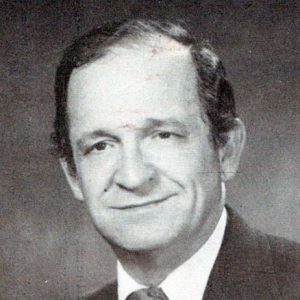 Joe Purcell
Joe Purcell  Purcell Bumper Sticker
Purcell Bumper Sticker  Purcell Campaign Card
Purcell Campaign Card 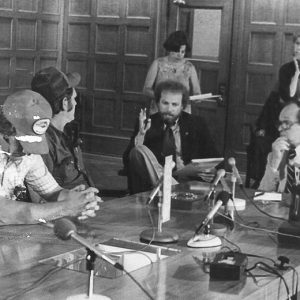 Joe Purcell in Meeting
Joe Purcell in Meeting 



Comments
No comments on this entry yet.